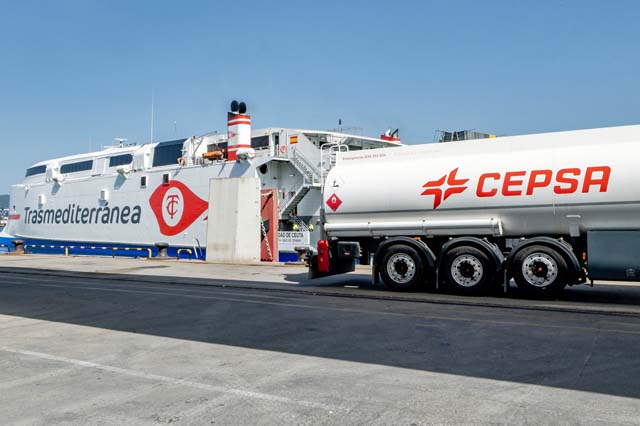Spanish oil company Cepsa will supply second-generation biofuels for 84 voyages of Naviera Armas Trasmediterránea from the Port of Algeciras, reinforcing its commitment to sustainable fuels for maritime transport in Spain.
These biofuels are produced at the San Roque Energy Park (Campo de Gibraltar, Cádiz) from agricultural waste that would otherwise end up in landfills, thus promoting the circular economy. The near-100t of renewable diesel supplied will avoid 63t of CO2 emissions. Biofuels can reduce CO2 emissions by up to 90% compared to conventional fuels, playing a key role in decarbonisation of hard-to-abate sectors like maritime transport.
Trasmediterránea ferries will make 84 trips to Ceuta across the Strait of Gibraltar using Cepsa’s second-generation biofuels. This is the first time in Spain that passenger ships will use this type of sustainable fuel, making Algeciras a leader in marine decarbonisation.
To produce this renewable diesel, Cepsa has transformed one of its plants in the San Roque Energy Park, adapting the Isomax unit for production of second-generation biofuels via co-processing.
Samir Fernández, Director of Marine Fuel Solutions, Cepsa, said: “We continue to promote sustainable mobility as one of the pillars of our strategic growth. With initiatives like these and the ones we are rolling out in air and rail transport, we are progressing towards our goal of becoming the leading biofuels producer in Spain and Portugal, while facilitating the decarbonization of our customers in the maritime sector.”
Agustín Aguilera, Trasmediterránea Director of Operations and Environment said: “At Naviera Armas Trasmediterránea, we are firmly committed to the requirements of the energy transition. This is defined in our carbon footprint reduction plan, certified by Lloyd’s and endorsed by the Ministry for the Ecological Transition and the Demographic Challenge. We have taken important steps in this direction. We’ve had a natural understanding with Cepsa, which is why we entrusted them with the supply of 2G biofuels that we are already using in our ships in the Strait of Gibraltar and will extend to the rest of our fleet.”
Second-generation biofuels can be used in ships without engine modifications and have high potential for reducing CO2 emissions compared to conventional fossil fuels. Specifically, during the entire life cycle, from production to use in ships, CO2 emissions can be reduced by up to 90% compared to conventional fossil fuels.
The Trasmediterránea ferries will sail with up to 15% renewable diesel in their tanks, meeting Fuel EU Maritime targets ahead of time.
Prior to this initiative, and through an analysis and testing phase at its research centre, Cepsa tested the efficiency of this second-generation biofuel in its own fleet of ships before starting to market it to customers, ensuring optimum engine operation and performance.
Cepsa has a diversified portfolio of solutions to facilitate the decarbonisation of maritime transport, with LNG as well as biofuels. In future, Cepsa expects to be able to supply synthetic marine fuels, such as green ammonia or methanol produced as part of the Andalusian Green Hydrogen Valley project.
Cepsa and the Port of Algeciras recently participated in at MEPC 80, where they presented different projects that both entities are working on to promote the decarbonisation of maritime transport.



